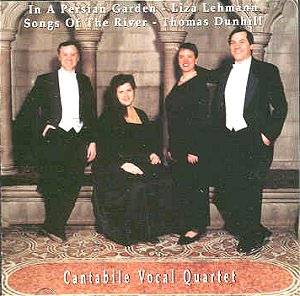Liza LEHMANN
In a Persian Garden
Thomas DUNHILL
Songs of the River
 Cantabile Vocal Quartet
Cantabile Vocal Quartet
Robin Sellati (Soprano), Sara Koulen (Mezzo), Roy Mazzacane (Tenor), Jack
Sellati (Baritone) with Douglas Dickson (Piano)
 Quattro Voci Records
Quattro Voci Records
AmazonUK
Amazon
US
http://pages.cthome.net/CLQ/

Elizabetta Nina Mary Frederica (Liza) Lehmann may well forever be most famous
for setting to music the unforgettable "There Are Fairies At The Bottom of
My Garden", but there is a lot more to this neglected British composer.
Originally she was a singer but her later training in composition took her
to Germany, to Italy, then home where she studied with Hamish McCunn and
her subsequent husband Herbert Bedford. You may not be aware her grandson
is the conductor Steuart Bedford. Liza Lehmann's background as a singer must
have dictated the fact that most, though not all, of her compositions involve
the voice and she herself rated her setting of Tennyson's "In Memoriam" her
best work. Certainly her working knowledge of the singer's art puts her work
a few steps above many contemporaries. There are also light operas, "The
Vicar of Wakefield" among them, cantatas, and other song cycles. But it was
"In A Persian Garden", her 1896 Omar Khayyam settings, which was her best
known substantial work enjoying vogue before the First World War when the
Victorian and Edwardian love of exotica, even erotica, albeit held
at decorous arms length and seen through the prism of imperial grandeur,
could penetrate the tightest of corsets and the stiffest of collars during
long country house weekends when much entertainment came out of the piano
stool. Musically this work climbs out of that particular pit and can be said
to have established the song cycle in England. Certainly it predates works
by Vaughan Williams, Butterworth and Ireland, whose own song cycles were
planted in "the land of lost content" whilst Lehmann's work was already in
full flower before the scythe of 1914. I'm sure I'm not the first to catch
a glimpse of these somewhere in the distance when listening to this work.
By the way, Lehmann herself, significantly, died in 1918.
The Cantabile Vocal Quartet has not tried in any way to recreate the atmosphere
of the Edwardian drawing room, the mannerisms of a time past. Even if such
a thing were possible it would be inappropriate to try. Fine music like this
doesn't need those kinds of tricks in order to be appreciated by a different
age. Consequently their creative restraint gives the kind of perspective
akin to a favourite painting freshly cleaned. Take the song "Myself When
Young Did Eagerly Frequent". I could imagine this being "hammed-up" by its
contemporary singers whereas Jack Selatti's simple soliloquy makes us appreciate
a melodic line that will go round in your head for the rest of the day. Likewise
the Quartet "They Say The Lion and The Lizard" with its colourful textures
and sense of momentum is assisted by attention to words and a real feeling
of ensemble. This is also the place to praise the refinement throughout of
pianist Douglas Dickson. The best known song in the cycle is "Ah moon of
my delight" and you can see why this would appeal to its audience with its
romantic-heroic overtones so evocative of the time it was written. You will
also notice a whiff of Borodin in Lehmann's writing here too. Roy Mazzacane
does allow himself just a little more dramatic licence but knows the point
when "less is more" and again seeks to re-introduce this style of music to
a modern audience. Interestingly Lehmann gives some really dramatic material
to the women. As a singer herself she must have seen the boys having the
fun all too often so decided to strike a blow. The soprano solo "I Sent My
Soul Through The Invisible", with its visions of Hell, goes to the soprano
and Robin Sellati has an ice-pure, note perfect voice to paint the words
superbly. Then the contralto solo "The Worldly Hope Men Set Their Hearts
Upon" finds Sara Koulen delivering the clinching imprecation to "Waste not
the hour!" with suitable finality and drama. The visiting clergyman to that
country house weekend would have approved of that, I think.
The disc is completed by Thomas Dunhill's "Songs of the River". He survived
World War II but his is still a backward-looking art for settings of poems
by Stevenson, Tennyson, Keats and Kingsley. This is no makeweight. Each song
is a small jewel for Quartet and, as with the Lehmann cycle, Cantabile Vocal
Quartet's equal care for words as well as for music gives great pleasure,
as does the atmosphere of intimacy they and their pianist convey.
Tony Duggan
Perfomance:

Recording:


